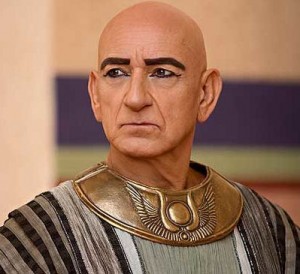When I watch a series like this, I’m always willing to suspend my disbelief a bit. For instance, I’m totally OK with the fact that the Spike TV miniseries Tut wasn’t subtitled in ancient Coptic. Seriously, that was fine.
“Fine” could also describe the facial features of the actor portraying the boy who was thrust onto the Pharaoh’s throne at ten years old, after his father’s death. (Tut’s father Akhenaten has a fascinating story himself.) Trouble is, that’s not at all what forensic scientists discovered through painstaking research and digital reconstruction on the remains of Tutankhamun. Indeed, the more realistic visage of the boy king is decidedly less romantic, lending credence to the claim that Tut had many health issues, most likely handed down to him from centuries of inbreeding.
But hey, let’s consider Spike’s target audience. Tuff guys making short work of their enemies and squiring jiggly girls has been (until recently, with the addition of new programming to appeal to women as well) pretty much the benchmark of anything the network would sink this much promotion into, so no surprise there. I pretty much expected it going in.
What struck me most was my rather odd tendency to squint my eyes or narrow my brows at some of the silliness in what should have been serious moments. Brilliant actor Ben Kingsley (obviously doing someone a favor or needing to pay a gambling debt or something) had so many meaningful solo glances during this series, it got to the point of being rather funny. The thought occurred to me, in a bored, goofy moment, that he might as well just break the fourth wall and totally give up a Frank Underwood. Would that not have been cool? I ask you.
Of course, there were the obligatory jiggle parts and seemingly hours-long battle scenes, but what taxed me the most was the glossing-over of who Tut really was (according to historians): a kid pushed into leading his country, having no idea what he was doing, forced to marry his sister, not remotely blessed in the looks department, and vanquished as a nobody after his death, with everything he ever said or did erased from all records, until the accidental discovery of his tomb in 1922. Without giving up too much of the plot, suffice it to say that he definitely did not die the way the writers of the series claimed. Maybe a little too much suspension of disbelief here.
And can I just share something while in my state of digression? Why, why, why do directors allow the ridiculous shing! sound of metal when a character lops off a guy’s head or pulls a sword out of somebody’s breadbasket? It’s like they’re removing the sword from a sharpening stone instead of soft tissue. Is the music teacher from Ohio the only one bugged to no end by this? It’s right up there with a movie character getting kicked or punched, and it sounds like a cabbage being smacked with a hammer. (Oftentimes, that’s what it actually is.)
Back to business here. The female leads in the series (those of Tut’s sister and his true love, a common girl from an enemy tribe) definitely provide major eye candy, but I found them surface, contrived and tiresome. It will not surprise you to learn that the Queen, Tut’s sister, was a sniping, jealous, conniving witch, and that Lover Girl was gorgeous and independent, yet completely naive of the Queen’s machinations against her until it’s too late. Pretty formulaic.
Still, it was a somewhat entertaining tale, which, fortunately, I recorded, so I could FF through the dozen or so commercials at every break.
As for anything approaching historical agreement, it’s a laffer, but don’t let that stop you. Instead, watch it for Kingsley’s eyeballing, and the outrageously campy performance — the absolute best of the whole piece, in my opinion — of Alexander Siddig as the scheming priest, Amun: a definite funny highlight, right down to his doing his own guyliner in one scene, to losing his everlovin’ mind in another. Hilarious.
On the Rat-O-Meter scale of five cheeses, I give Tut:




I absolutely could not finish watching the program…made it 2/3 through and bailed. It was what I had hoped it would not be.
Fighting, battlefield, killing sounds are most of the time hilarious. The one that really gets me is the obligatory richocet sound after a bullet hits anything…even sand.
Great review, about a half of cheese too generous.
The ricochet! I forgot about that one, lol. Oh, Hollyweird…we love you. You might have agreed with the extra half cheese had you watched the priest lose his poop during the last episode. It was awesomely hilarious — the half cheese was for him alone!
Thanks for this. Spared me watching it, as I had intended at some point. The antidote is to watch “Ultimate Tut”, a PBS Secrets of the Dead episode currently on Netflix. It’s fantastic.
I will check those out, definitely! And something else I forgot to mention: it showed six guys carrying the inner coffin (made of solid gold) down a long parade of onlookers — effortlessly. Carter, in his excavation notes, said that the final coffin was “as heavy as eight strong men could lift.” So much for the six pallbearers parading him through Thebes…
Watched it last night — fascinating! And I must say, I learned some new things, not the least of which was maybe the producers of Tut had more right than what my research gave them credit for. Obviously, there are several schools of thought about how Tut died, and one of them (the one from the PBS docu) was indeed that he was killed in battle.